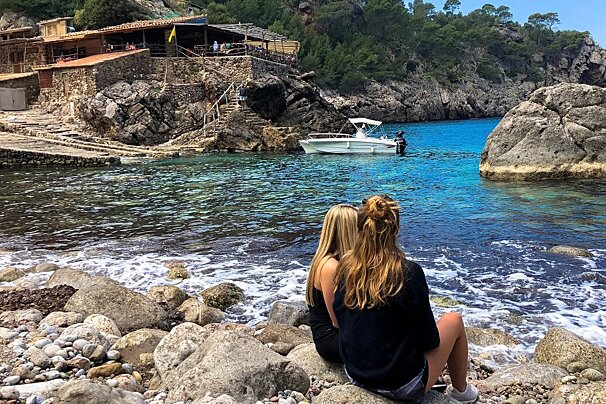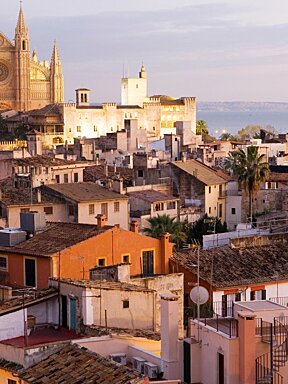
© SeeMallorca.com
Buying property in Mallorca
Discover the Mallorca property buying process
It’s everybody’s favourite holiday island, but Mallorca has offered much more than a fortnight in the sun for successive waves of settlers for the last 5,000 years. Today’s new residents are part of a society that is the wealthiest in the whole of Spain. That fact is reflected in the property prices and the now-controlled residential development regime on the Island.
Mistakes of the Sixties and Seventies tourism boom, that sent high rise condos and hotels shooting up along many of splendid beaches in the south will not be repeated, and restricted supply of newbuild homes – and the resultant high prices - will avoid mass residential invasion.
The string of beaches, spoilt and unspoilt resorts and villages are the pearls in the coastal necklace and the focus for package holiday and residential tourism. Inland is the haunt for the culture buffs, hikers and mountain bikers and for wealthy families from Germany, Britain and Scandinavia who enjoy a lotus eating life in the sun with their Mallorcan neighbours. They enjoy a full social calendar with a continuous round of festivals, carnivals, saints’ and sports days with an emphasis on classical music, a legacy from the notable sojourn of composer, Frederick Chopin.
That Palma Airport is one of the busiest in Spain and Europe means there are cheap, plentiful flight options for property buyers and the families to whom they rent out their apartments and villas. With Spain’s Royals, Hollywood and Rock stars summering on the Majorca, it's an island that has something for everyone. On offer for property buyers is a range of upmarket condos close to great beaches, sea view villas perched on inland bluffs or cliff tops and hinterland farms with lots of land, olive and fruit trees. Those buildings that are in need of much TLC are not cheap, but seem so when compared with some of the magnificent refurbished finca estates, like that of Christopher Columbus’s family who moved into the Mallorca's oldest property in AD500. It was sold recently through Property in Spain.
Start buying property
Apart from checking our Property For Sale page, there are many options when purchasing your property in Mallorca:
- Local Estate Agents
- Property searchers
- Using the services of a Solicitor ('Notario')
- Buying a new build
Estate Agents
For those who don’t speak fluent Spanish, the option of using an estate agent is generally preferred. Estate agents are known as Immobiliarias in Spain and they are only lightly regulated by the government so make sure that the agent you work with displays knowledge of the market and works in a professional manner. Most are multi-lingual and they tend to be regionally based ie agents in the south west will only sell properties in the south west. The price of properties that are advertised with an agent generally already include their agency commission fees (usually around 5%). This is important to know when it comes to fees & taxes, as these should be based on the cost of the property only. Note also that a property may be offered by more than one agent and the asking price may vary – this can be a reflection of commission charges or simply that the vendor is trying his luck!
Property Searchers
Property searchers will look at properties that are within your price range and match your requirements. Most will offer a personal service, taking you to view the properties they have short-listed. Some property searchers charge a fee while others prefer to take a percentage commission from the Inmobilario instead.
The Notary
A public official known as a 'Notario'. They are highly qualified in the Spanish legal system and have been given powers by the State to legalise property purchase transactions that cannot be enforced by any other means. their responsibilities include conveyance, preparing the various documents and confirming the seller's title to the property, checking that there are no other mortgages on the property, etc. The notary is responsible for the legality of all documents that are signed before them in their personal capacity, which provides a guarantee for the client.
New build & developments
If you are buying a new build off-plan, you are more likely to deal with the developer themselves rather than the agent (who may only be involved at the introductory stage). It’s worth doing some research on the developer to see what kind of properties they produce, and whether issues & complaints have arisen from previous developments.
The buying process in Mallorca can be a bureaucratic affair and it is strongly recommended that professional advice, in the form of independent property lawyers, is sought. Beware of lawyers recommended by the estate agent as there may be a conflict of interests should a dispute arise between yourself and the agent. Ensure that your lawyer is registered with Bar Association (Colegio de Abogados).
As a foreign property owner in Spain, you will need to obtain a NIE number – this is a ‘foreign identity number’ which is required to pay your property taxes. Your lawyer can apply for one on your behalf or you can contact the Spanish authorities yourself – the process can take anything from two to six weeks. Your lawyer will help you with the contracts, payments, look out for all your interests and register your property for you at the Land Registry. Lawyers typically charge 1.0% to 1.5% of the property price, or you may prefer to negotiate an hourly rate.
It is advisable to explore your mortgage options before you start your property search. This way, you will be under no time pressure to find the best mortgage for your circumstances and this will save you money in the long run.
Buying process
So, you've found the perfect property in Spain and now want to invest? Unsure of your next steps? The following process outlines the general buying process for your Spanish property. You must:
- sign an initial contract called the 'opcion de compra'
- arrange the mortgage & pay the deposit for the property
- instruct the notary
- completion
Opcion de Compra
Once you have had an offer accepted on a property, a legal document known as the ‘opcion de compra’ will be drawn up and a deposit of around 5-10% becomes due. It is normal to give your deposit to the agent or your lawyer who will hold it safely until the purchase is completed. The ‘opcion de compra’ is a legally binding contract and is written in Spanish although you can ask for a translation too. The contract contains the details of the vendor, purchaser & the agent, the purchase price, a full description of the property, including floor space measurements, any fixtures or fittings that are included in the price, who is responsible for what fees, the mortgage arrangements, and any get out clauses that have been agreed & corresponding penalties should the buyer or vendor withdraw from the sale. The get out clauses are important if you are unsure about the success of your mortgage application, or if the vendor has agreed to certain repairs in the property.
For new build properties, there will be specific payment plans that you will need to agree with the agent or the developer.
You may also want to sign an agreement which protects against gazumping, or from the seller withdrawing - the 'clause crio'. This security deposit will be lost if you decide not to proceed, but the seller will have to pay you twice that sum if they decide to withdraw. The security deposit (along with your initial deposit) is subtracted from the purchase price when completion day arrives.
Mortgage
If you are thinking of arranging a Spanish mortgage, you can expect to get 60-70% of the purchase price if you are non-resident. In a similar fashion to those in the UK, the mortgage company will send a valuer to the property to ensure that the loan is proportionate. Associated fees and charges can be negotiable. Life assurance is required to take out the mortgage. If your Spanish is a little rusty, you can employ a mortgage broker to liaise between yourself and the bank. The bank will also need proof of income (pay slips or accounts if self-employed) and copies of your tax return. Of course, a Spanish bank account will also have to be opened.
Notary
As you near the completion date, you will need to instruct a Notary. The Notary is a public official who oversees all property transactions in the country. It is a legal requirement to use a Notary – the notary is the only person who can transfer your name on to the title deeds which confirms you are the legal owner. The Notary is responsible for ensuring all the documentation used in property transfers is true and legal – confirming the vendor’s title deed, checking for any outstanding mortgages on the property, transferring the deeds etc. The Notary fee is controlled by the state.
Completion
Once finance is in place, you need to instruct the notary to request the funds in time for the completion date. Make sure you have buildings insurance in place for this date. On the date of completion, an Escritura (final deed of sale) will be signed by the buyer, the vendor & the notary. If you cannot be present for this signing, you can give power of attorney to someone to sign on your behalf. The remainder of the purchase price must be paid at this time and the associated taxes should be paid within 30 days. Your title deeds will be sent to you a couple of months later, and the original will be returned to the notary for safe-keeping. Copies are available on request.
Offer to completion process
During the buying process you will be required to sign official documentation and hand over the required cash to make the property legally yours. Buying property abroad can sometimes become a complicated process and you should note that in many countries, the process varies significantly from that of the UK. It is strongly advised that, before committing, you arm yourself with all the relevant purchasing information and complete all necessary financial and structural checks relating to your property. Before signing any official documentation you should make sure you fully understand the legal complexities involved in your purchase and, if possible, make sure you have a solicitor who is fluent in both English and Spanish, so they can explain to you exactly what you are signing.
To get an initial snapshot of the property’s legal status, you can apply to the Land Registry (Registro de la Propiedad) for a ‘Nota Simple’ and this can be ordered through the website, for a small fee. The estate agent sometimes will have this on file. The Nota Simple allows you to check who the legal owner is, and whether there are any restrictions or injunctions associated with the property. Be sure that your property is actually registered on the Land Registry otherwise you will be unable to obtain mortgage finance. You can do a private deal between yourself and the vendor if it is a cash purchase, but the property will not then be registered and you may find it difficult to sell in the future. Before you hand over any money to continue the buying process, make sure that you have checked the land registry to confirm the legal owner, any outstanding debts, and any restrictions.
Whether you have found a new build or an old farmhouse, this is the time to instruct a lawyer. It is also highly advisable to get your prospective property purchase surveyed. The Royal Institute of Chartered Surveyors (RICS) has members in several areas in Spain – just look for the RICS qualification when searching for a surveyor. Members of RICS will be able to provide independent, impartial advice in English and they are bound to a strict code of conduct in their professional duties. Sometime the vendor will try to refuse access to the property until an offer has been agreed. If this happens, make sure you have inserted a get-out clause in the initial agreement if the survey brings up any issues.
The advertised price of a property is generally a guide price so don’t be afraid to enter into negotiations if you feel it is over-priced. Do some research on similar sized properties to ensure you are paying a fair price. If the agent’s fee is included in the price, you may actually be negotiating their commission rather than the price of the property. Sometimes the local taxes end up being paid by the buyer so this should also be taken into consideration when placing an offer. You will have to agree who is to pay the local IBI tax for that year, and ensure that it is clear who will pay the Plusvalia – this is the vendors responsibility but can be passed on to the buyer.
Note that you will become responsible for any outstanding debts once you become the owner. Ensure the deeds describe the property accurately and in detail. Check that the town hall has agreed to all the necessary planning permissions. You should also access the Catastral certificate (which tells you the boundaries of your land) and the licence of first occupancy which you will need in order to be connected to water & electricity. Ensure that it is agreed who will be paying any outstanding taxes and utility bills.
Property buying fees
When buying your dream property in Spain you should take into account the various fees and taxes. As a general rule of thumb, you can expect to pay an additional 10% of the purchase price.
Here are some examples of the costs to look for:
- solicitor (or 'notaire') fees and commission
- estate agent fees
- property tax
- plusvalia tax
- foreign currency exchange costs (if applicable)
- VAT & stamp duty
- mortrgage fees
Solicitor or 'notaire' fees
Notary fees and a property registration fee will also be due. The amounts will vary according to the purchase price of the property.
Estate agent fees
This is a question you should ask the estate agent at the beginning of your purchasing process. They will earn commission from the sale and so will naturally try to get the best possible price for the property.
Property Tax
These costs include a property tax which is around 7% of the price paid for the property. This property tax is also known as the transfer tax, or ‘Impuesto de Transferencia de Propiedad’.
Plusvalia Tax (Capital Gains Tax)
The plusvalia tax is normally paid by the seller but sometimes this tax is passed on to the buyer. It is similar to capital gains tax and is related to how much the land on which the property sits has appreciated during the time of the previous ownership.
Foreign currency – foreign exchange rate fluctuations
If you are planning to purchase your overseas property with equity released from the remortgage of a UK property or other cash funds, then you may need to convert your money into euros. This can be expensive and risky as you leave yourself open to currency exchange rate fluctuations. There are steps you can take to minimise these risks, such as using a company to effectively ‘lock’ your exchange rate months in advance. Today, there are a lot of companies that provide currency exchange risk solutions.
VAT & Stamp Duty
There is no additional stamp duty or VAT to pay for existing properties.
If you are buying a new build, you will be liable for VAT on the price of the property. Stamp duty is also payable – this can range from 0.3% to 2.0% depending on the property. You are responsible for paying this tax by filling in a form available from your local government financial institution. Ask for a bank guarantee when making stage payments – the developer is legally obliged to secure deposits in a special, separate account which can only be used for building purposes. An off-plan property should have a certificate (certificado de final de obras) proving the finished build has been signed off by a registered architect. For more information on this, take a look at the British Consulate advice pages.
Mortgages
Spanish banks can lend between 60 & 70% to non-residents and often more to residents. This amount will be based on their valuation of the property, The cost of this valuation will be included in charges for the mortgage application; the application costs will vary according to the purchase price of the property.
To apply for a mortgage you must ensure that:
- You have sufficient income to cover your mortgage
- You have life insurance cover
You should always consult a professional when considering your Mallorca mortgage options so that you understand the various implications. There are several options:
- Spanish banks and mortgage providers - they have their own lending criteria including how much they will lend, the term of the mortgage, what products they offer and charges for their arrangement fees.
- A mortgage broker - they can provide advice about borrowing and the mortgage products which will best suit the circumstances. A mortgage broker may have a better local knowledge of which lenders to approach and an idea of quotes for lenders. They can act as a liaison between yourself and the lender, which is particularly useful if you are not fluent in Spanish. As a general rule mortgage brokers registered in Spain will receive commission directly from the lender and so do not charge a fee.
- The Inmobilario (estate agent) may offer a mortgage service and usually will offer a service similar to that of a mortgage broker
You will be asked for proof of income in the form of pay slips for employed applicants or one or two years accounts for self-employed. Tax declarations from the buyer's country of tax residence are also required.
General taxes
As an owner of a property in Spain, you will become responsible for the associated property taxes.
There is Patrimonial Tax (newly re-introduced wealth tax) which is based on the rateable value of your property, and this is paid annually in December.
Spanish Succession Laws (Inheritance) - it is essential that you draw up a Spanish will to cover any property and assets in Spain. This is especially important if there are children or step children involved. A notary will be able to legalise the documentation.
Local property taxes
The two local Mallorca taxes are the Taxes IBI (local tax) and the Basura, which pays for rubbish collection. Both of these taxes are decided and collected by the local town hall and will vary from region to region. The agent should be able to advise on the amount payable for your property before you buy.
Both of these are paid to an agency called SUMA, a part of local government. Most towns should have their own SUMA office.
Foreign property taxes & legalities
Don't rely on your estate agent or seller to furnish you with all the facts, they are afterall after the sale and won't want you to be delaying that process completing.
When buying in a foreign country, you should always consider the tax implications of buying, selling and possibly renting out your property. Taxes rules and rates can vary immensely from location to location so make sure you have done your homework as unexpected taxes could be crippling for you further down the line. Your tax situation may well be affected as a result of your foreign property purchase so advice should be sought from a professional who can offer specific guidance on issues such as:
- taxation in the UK
- capital gains tax
- succession laws and inheritance tax
- foreign taxation
- and
- double taxation implications
For example, did you know that if you decide to rent out your property abroad you will need to declare this income to the taxman in the UK and potentially the country where you have bought the property, no matter how small the sums involved? And, did you know that most countries will apply some form of 'gain taxation' against the sale of a second home? You may therefore wish to set this off against the profit you make on your purchase when selling it at a later date. You should also be aware that some countries have different succession and inheritance taxes and laws that are very different to that in the UK which can lead to expensive traps for the uneducated.
These are just a few areas within the complex subject of property taxes which may, or may not be applicable to you when purchasing your property abroad. It's therefore vital that you seek solid tax and legal advice before taking the plunge on any type of foreign property.
Please note that foreign property taxation and legal issues are complex and difficult subjects with which you should seek independent advice individual to your requirements. Taxes and legal issues outlined here are merely general in nature and therefore no liability is accepted in connection with the information provided.


























